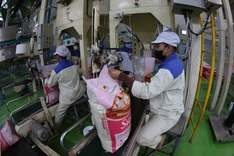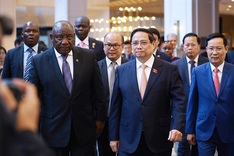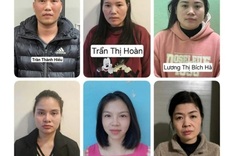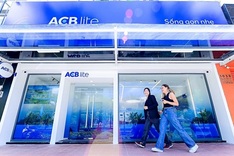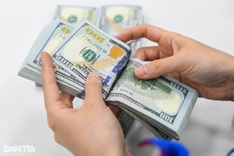>> Money troubles: searching for a dollar
>> Black market for USD thrives despite ban
>> Black market USD trade almost non-existent
Barriers for trading foreign currencies are expected to be partially removed by revised policies from the Government and the central bank.
 |
| Barriers in foreign currency trade is gradually removed |
Recently, the State Bank of Vietnam (SBV) proposed solutions to the Government for the problems in the trade of foreign currency, because the official market has not been able to meet real demand.
According to SBV, commercial banks and financial institutions should be allowed to negotiate with their clients about exchange rates for terms of between three months and one year.
A trading fee of 2% should be applied in foreign currency selling to individuals with account transactions. The payment is expected to offset banks’ expenses on foreign currency imports.
These institutions could maintain its foreign currency services to exporters. In the meantime, they may have to tighten policies for importers to ensure sufficient supply.
SBV said some more regulations would be issued to help meet people’s real demand for USD as well as to increase the liquidity.
In order to meet people’s demand for foreign currency trading, DongA Bank has decided to sell various types of foreign currencies to individuals beginning March 23.
Clients are advised to make notices seven days before real transactions. In case that the bank runs out of particular currencies, clients may get EUR instead.
DongA Bank will sell foreign currencies based on its limits to particular purposes such as tourism, business trips, healthcare and study.
Concerning SBV’s proposal to collect transaction fee for foreign currency trading, many commercial banks have agreed with.
Tran Trong Quoc Khanh, Director of Asia Commercial Bank\'s gold centre, said, “We do not print USD but have to import mainly from Singapore. We’re paying a transaction fee of over USD0.1 for each dollar transferred via accounts, in addition to other service fees.”
In consent to Khanh, Tran Phuong Binh, General Director of Eastern Asia Commercial Bank (EAB) said that in order to ensure foreign currency supply for individuals, banks will have to spend more to keep a store of these banknotes. .
Binh emphasised the necessity of collecting transaction fees for these currencies to prevent possible losses for bands and ensure reasonable exchange rates.
“Banks may have to make efforts to satisfy the current high demand for foreign currency in face of a short supply. Normally, priority has often been given to enterprises because most individuals have bought in small denominations,” said Bui Tan Tai, Deputy General Director of Asian Commercial Bank (ACB).

